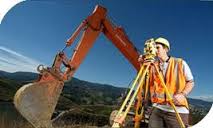
Nature of work
A surveyor measures distances, directions, and angles between points on, above, and below the Earth's surface. He/she selects known reference points and then determines the exact location of important features in the survey area using special equipment. He/she also establishes official land and water boundaries, researches land records and other sources of information affecting properties. He/she travels to places to measure distances and directions between point, records the results of surveying and verify the accuracy of data. He/she prepares plots, maps, and reports. He/she works with cartographers (mapmakers), architects, construction managers, and others. He/she presents results to clients, government agencies, and others. He/she writes descriptions of land for leases, and other legal documents. He/she guides construction and development projects and provide information needed for the buying and selling of property. In construction, a surveyor determines the precise location of roads or buildings and prospers depths for foundations and roads. Whenever property is bought or sold, it needs to be surveyed for legal purposes. Environment of work
Surveying involves both field work and indoor work. Field work involves working outdoors, standing for long periods, and walking considerable distances. Surveyors sometimes climb hills with heavy packs of instruments and other equipment. When working outside, he/she is exposed to all types of weather, and he/she may need to stop outdoor work in bad weather. He/she also does many tasks indoors, including researching land records, analyzing field survey data, mapping, presenting information to regulatory agencies. Traveling is sometimes part of the job, and he/she may commute long distances or stay at project locations for a period of time. He/she usually works full time. He/she may work longer hours during the summer, and long hours of daylight are most suitable for field work. Professional life
The demand for traditional surveying services is closely related to construction activity and opportunities will vary by year and geographic region, depending on local economic conditions. When real estate sales and construction slow down, a surveyor may face greater competition for jobs. However, because a surveyor can work on many different types of projects, he/she may have stable work when construction grows slowly. Lots of firms are interested in geographic information and its applications. A surveyors will still be needed for legal reasons to verify the accuracy of the data and information gathered for input into a GIS. He/she has traditionally relied on construction projects for many of his/her opportunities increased the demand for geographic data which mean better opportunities for professionals who are involved in developing and using GIS technology and digital mapmaking. Other opportunities should result from the many surveyors who are expected to retire or permanently leave the positions for other reasons.Typical starting salaries: 35000 SYP.
Getting the job
A surveyor typically needs a bachelor’s degree. He/she must be licensed before he/she can provide surveying services to the public and certify legal documents. A surveyor who is not licensed can work as survey technicians, but he/she must work under the supervision of licensed surveyors. Skills
There are many skills he/she needs to have and tries to improve, such as:Communication skills. On the job, a surveyor has to give team members clear instructions.
Detail oriented. He/she must work with precision and accuracy because mistakes can be costly.
Interpersonal skills. Surveying is a cooperative operation, so a surveyor must be able to work well on a team.
Physical stamina. He/she traditionally works outdoors and often in rugged terrain. He/she must have the ability to stand on his/ her feet for many hours and over many weeks.
Problem-solving skills. He/she must figure out discrepancies between documents showing property lines and current conditions on the land.
Time-management skills. He/she must be able to plan not only his/ her time on the job but also that of their team members.
Visualization skills. He/she must be able to envision objects, distances and sizes.
Sources and references
If you need any further information on what is included in this file, you can visit the following websites:- www.surveyors.com, Surveyors website is a complete surveyors guide.
- The Order of Syrian engineers, Damascus, Tel: 6627256
- www.arab-eng.org, Arab Engineers Forum.
- Arab Standard Classification of Occupations, 2008, Ed. Arab Labor Organization.
